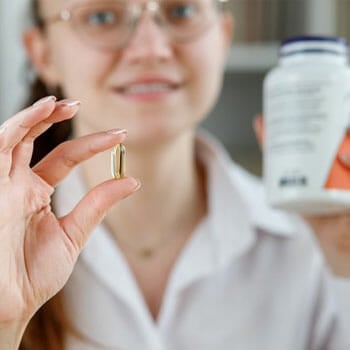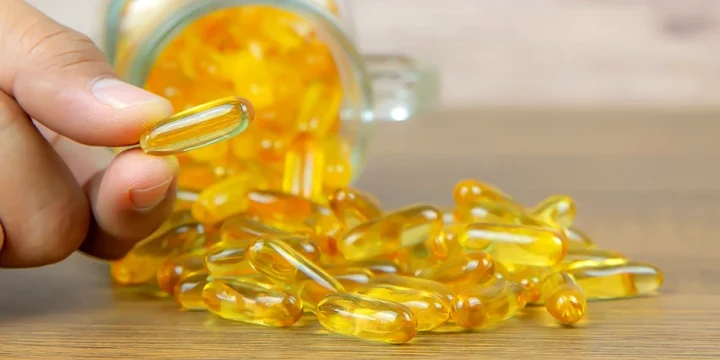Fish oil supplements provide overall health benefits, but there’s something fishy about them that turns off people from taking them – the dreaded fishy taste or burps. It may just cause you to shy away from conversations.
As a health optimization coach, I spent time researching whether there are ways to get rid of the aftertaste and burps.
So, before you cast aside your fish oil capsule bottle, try these tips to reduce the fish oil aftertaste.
Quick Summary
- To get rid of the fish oil taste, consider consuming your supplements with food, taking the fish oil capsules when frozen, or trying different flavored fish oils.
- Fish oil offers the body numerous benefits, such as preventing heart disease and reducing inflammation.
- 33% of US households take fish oil supplements, and more consumers (90%) associate health benefits with fish/seafood over fish oil supplements (82%).
- I've found that high-quality, fresh fish oil supplements tend to have less aftertaste, making them preferable for daily use.
Ways To Get Rid Of the Fish Oil Taste

Here are five tips to prevent the off-putting fishy aftertaste.
1. Take the Fish Oil Capsules Frozen
Freezing slows down the breakdown and absorption of fish oil, reducing aftertaste without affecting the fatty acids' availability.
2. Consume Fish Oil Supplements With Food

Consuming fish oil with food can mask the taste and help absorb more Omega 3 by keeping the oil in the small intestine longer.
So, start a meal, take the capsules, and eat more to “trap” the fish oils and mix them with other foods.
3. Divide the Dosage
Dividing the dosage of fish oil supplements into smaller, more frequent doses can lessen burps and aftertaste and minimize the risk of stomach upset or heartburn.
4. Try a Different Brand

If you still get the fishy taste after trying all the above, then trying other pharmaceutical-grade brands may do.
You can get quality fish oil from these brands as they contain the highest concentration of Omega 3 fatty acids, especially EPA and DHA essential fatty acids.
Also, manufacturers that maintain strict standards on oxidation provide quality ones, too.
Generally, when a fish oil supplement tastes better, you may get more Omega 3 fatty acids in lesser amounts.
Therefore, look for a fish oil supplement that will provide a 2000-4000mg daily dose of DHA and EPA.
To test the fish oil’s quality break open the capsule; if its odor is like rotting fish, it’s a sign that it’s rancid.
5. Look For Enteric-Coated Fish Oil
Fish oil supplements with enteric coating help keep the capsules from breaking down in the stomach until they reach further down the small intestines.
In addition, the enteric coating helps to ensure the capsules do not taste fishy, thus reducing the fish oil burps because they are not digested in the stomach.
So, better look for manufacturers that produce fish oil capsules with enteric coating.
What Causes Fishy Tasting Burps?

Fishy tasting burps are caused by premature capsule dissolution in the stomach, influenced by the quality of the fish oil and the capsule casing, and exacerbated by additives in some casings.
There are additives in a few capsule casings that may cause bloating, upset stomach, or bad gas, leading to dreaded burps.
Look for casing options designed to be easier on the gut.
”Ingesting high-quality fish oil saves you money, gives you optimal nutrition, and provides you the highest benefits for your health.”
- Warren Maginn, Clinical Nutritionist & Founder of Warren Maggin Functional Clinical Nutrition
And low-quality Omega 3 fish oil can worsen matters, causing fishier burps sooner than the stomach does the digestive work. So, stick to better oils to stop burps.
How Does a Fish Oil Supplement Taste?

To test if the oil has gone rancid, break open the capsule and smell the oil.
Or check the oxidation levels or peroxide value to measure its rancidity level — the lower the number, the fresher the oil.
How Do You Avoid Rancid Fish Oil?
To avoid fish oil becoming rancid, it's important to store it in a location that is free from oxygen, heat, and light, and opt for products that contain antioxidants such as Vitamin E [1].
Two Home Remedies to Mask Fish Oil Taste
There are two ways to mitigate the fishy aftertaste, making supplementation more pleasant.
Citrus-Based Solutions
Citrus flavors, particularly from lemon or orange, contain compounds that can help neutralize fishy flavors. Adding citrus juice to fish oil or taking supplements with citrus oils can mask the aftertaste.
Complementary Food Pairings
Certain foods, like those high in fiber or complex carbohydrates, can absorb some volatile compounds responsible for fish oil's taste. Pairing fish oil with such foods can help reduce the aftertaste and make daily supplementation more tolerable.
FAQ
What Does Omega-3 Do for My Physical Condition?
Omega-3 enhances your physical condition by reducing inflammation, improving heart health, and supporting muscle recovery after exercise.
Can I Take Fish Oil Daily?
Yes, you can take fish oil every day because it contributes to daily Omega-3 requirements, supporting cardiovascular health and cognitive function.
How To Choose Fish Oil?
To choose fish oil:
- Get the right dosage based on your needs and activity level.
- Opt for organic sources to minimize exposure to toxins and heavy metals.
- Look for fish oil containing both EPA and DHA in a 3 to 1 ratio.
- Prioritize Omega-3 over Omega-6 fatty acids for muscle growth and recovery.
- Consider fish oil with added vitamin boosts for overall health benefits.
- Avoid unnecessary additives like fillers, preservatives, and artificial flavors in fish oil supplements.
Reference:
- https://pubmed.ncbi.nlm.nih.gov/23105601
About The Author
You May Also Like






